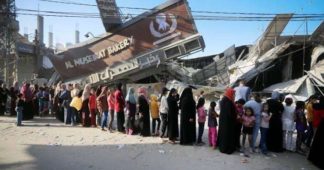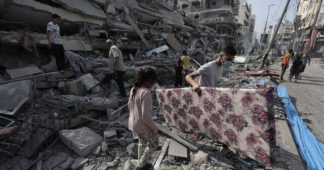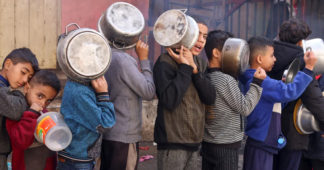Food security head Prof. Roni Strier, appointed by the previous government, warned that Israel is party to international agreements that require it to protect civilian lives in war zones and obey ‘clear rules of the game’
By Bar Peleg
Mar 3, 2024 The head of Israel’s National Food Security Council, Prof. Roni Strier, is calling for a cease-fire in the Gaza Strip because of the dire humanitarian situation there. Strier wrote on his personal Facebook account on Friday that Israel wasn’t taking the humanitarian condition of Gaza’s civilians into account because of the pain of the October 7 massacre, adding that “Israel can’t ignore the humanitarian considerations it is obligated to both morally and politically.” Strier has stood against the government’s positions over the past year, including both on the judicial overhaul and professional issues related to providing food aid to those in need. The Food Security Council operates within Israel’s Welfare Ministry, and Y’aakov Margi, the Welfare and Social Affairs Minister, has been pushing in recent months to close the council as an independent body and make it answer directly to him. Strier wrote in his Facebook post that the humanitarian condition of hundreds of thousands of men, women, and children in Gaza “is not perceived as a legitimate factor for consideration” in Israel. “There are solid eyewitness accounts by international organizations that we have ongoing working relationships with such as the World Bank, the World Health Organization, the World Food Programme – and various institutions like international aid organizations and the global press –attesting to the exceptional humanitarian disaster, which includes extreme hunger of the local population,” wrote Strier. Strier also noted that Israel is a signatory to international agreements that oblige it to respect the “clear rules of the game” for safeguarding the lives of civilians in war zones. “These rules require the maintenance of a constant supply of food, water, medicines, and other basic products to the civilian population,” Strier wrote. Writing on the death of Gazans at an aid convoy on Thursday, Strier said that the incident “indicates the extent of the humanitarian crisis gripping Gaza, and added that “The Israeli government can’t absolve itself of responsibility for this situation.” Margi’s predecessor, Meir Cohen, appointed Strier as the head of the Council in what was the first time someone had held the position in three years while the council lay dormant. Last March, Strier wrote to Margi that the judicial overhaul risked harming Israel’s weaker socioeconomic classes, adding that “Social justice is secured by an independent judiciary.” Two months later, the council, under his leadership, fiercely opposed Shas party chairman Arye Deri’s plan to distribute food stamps independently on behalf of the Interior Ministry. In December, Haaretz reported in Hebrew that the Welfare Ministry was ignoring the recommendations of an inter-ministerial committee coordinated by the council to provide food aid to victims of the war. In August, lawmaker Yinon Azoulay of the Shas party sponsored a bill to establish an authority for combatting poverty that would effectively make the Food Security Council directly answerable to Minister Margi – his Shas colleague – and thus strip it of its independence. The Council also didn’t receive additional funding in the amended 2023 budget that the government passed. Council officials assert that they are being bled dry for their opposition to Deri’s plan. We remind our readers that publication of articles on our site does not mean that we agree with what is written. Our policy is to publish anything which we consider of interest, so as to assist our readers in forming their opinions. Sometimes we even publish articles with which we totally disagree, since we believe it is important for our readers to be informed on as wide a spectrum of views as possible.
Mar 3, 2024 The head of Israel’s National Food Security Council, Prof. Roni Strier, is calling for a cease-fire in the Gaza Strip because of the dire humanitarian situation there. Strier wrote on his personal Facebook account on Friday that Israel wasn’t taking the humanitarian condition of Gaza’s civilians into account because of the pain of the October 7 massacre, adding that “Israel can’t ignore the humanitarian considerations it is obligated to both morally and politically.” Strier has stood against the government’s positions over the past year, including both on the judicial overhaul and professional issues related to providing food aid to those in need. The Food Security Council operates within Israel’s Welfare Ministry, and Y’aakov Margi, the Welfare and Social Affairs Minister, has been pushing in recent months to close the council as an independent body and make it answer directly to him. Strier wrote in his Facebook post that the humanitarian condition of hundreds of thousands of men, women, and children in Gaza “is not perceived as a legitimate factor for consideration” in Israel. “There are solid eyewitness accounts by international organizations that we have ongoing working relationships with such as the World Bank, the World Health Organization, the World Food Programme – and various institutions like international aid organizations and the global press –attesting to the exceptional humanitarian disaster, which includes extreme hunger of the local population,” wrote Strier. Strier also noted that Israel is a signatory to international agreements that oblige it to respect the “clear rules of the game” for safeguarding the lives of civilians in war zones. “These rules require the maintenance of a constant supply of food, water, medicines, and other basic products to the civilian population,” Strier wrote. Writing on the death of Gazans at an aid convoy on Thursday, Strier said that the incident “indicates the extent of the humanitarian crisis gripping Gaza, and added that “The Israeli government can’t absolve itself of responsibility for this situation.” Margi’s predecessor, Meir Cohen, appointed Strier as the head of the Council in what was the first time someone had held the position in three years while the council lay dormant. Last March, Strier wrote to Margi that the judicial overhaul risked harming Israel’s weaker socioeconomic classes, adding that “Social justice is secured by an independent judiciary.” Two months later, the council, under his leadership, fiercely opposed Shas party chairman Arye Deri’s plan to distribute food stamps independently on behalf of the Interior Ministry. In December, Haaretz reported in Hebrew that the Welfare Ministry was ignoring the recommendations of an inter-ministerial committee coordinated by the council to provide food aid to victims of the war. In August, lawmaker Yinon Azoulay of the Shas party sponsored a bill to establish an authority for combatting poverty that would effectively make the Food Security Council directly answerable to Minister Margi – his Shas colleague – and thus strip it of its independence. The Council also didn’t receive additional funding in the amended 2023 budget that the government passed. Council officials assert that they are being bled dry for their opposition to Deri’s plan. We remind our readers that publication of articles on our site does not mean that we agree with what is written. Our policy is to publish anything which we consider of interest, so as to assist our readers in forming their opinions. Sometimes we even publish articles with which we totally disagree, since we believe it is important for our readers to be informed on as wide a spectrum of views as possible.











